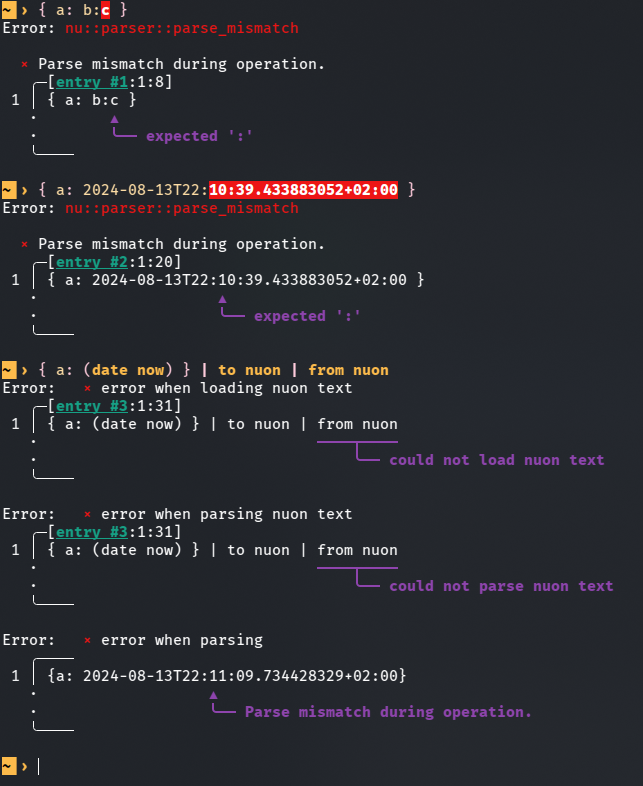mirror of
https://github.com/nushell/nushell.git
synced 2025-07-29 22:02:09 +02:00
This PR is an attempt to fix #8257 and fix #10985 (which is duplicate-ish) # Description The parser currently doesn't know how to deal with colons appearing while lexing whitespace-terminated tokens specifying a record value. Most notably, this means you can't use datetime literals in record value position (and as a consequence, `| to nuon | from nuon` roundtrips can fail), but it also means that bare words containing colons cause a non-useful error message.  `parser::parse_record` calls `lex::lex` with the `:` colon character in the `special_tokens` argument. This allows colons to terminate record keys, but as a side effect, it also causes colons to terminate record *values*. I added a new function `lex::lex_n_tokens`, which allows the caller to drive the lexing process more explicitly, and used it in `parser::parse_record` to let colons terminate record keys while not giving them special treatment when appearing in record values. This PR description previously said: *Another approach suggested in one of the issues was to support an additional datetime literal format that doesn't require colons. I like that that wouldn't require new `lex::lex_internal` behaviour, but an advantage of my approach is that it also newly allows for string record values given as bare words containing colons. I think this eliminates another possible source of confusion.* It was determined that this is undesirable, and in the current state of this PR, bare word record values with colons are rejected explicitly. The better error message is still a win. # User-Facing Changes In addition to the above, this PR also disables the use of "special" (non-item) tokens in record key and value position, and the use of a single bare `:` as a record key. Examples of behaviour *before* this PR: ```nu { a: b } # Valid, same as { 'a': 'b' } { a: b:c } # Error: expected ':' { a: 2024-08-13T22:11:09 } # Error: expected ':' { :: 1 } # Valid, same as { ':': 1 } { ;: 1 } # Valid, same as { ';': 1 } { a: || } # Valid, same as { 'a': '||' } ``` Examples of behaviour *after* this PR: ```nu { a: b } # (Unchanged) Valid, same as { 'a': 'b' } { a: b:c } # Error: colon in bare word specifying record value { a: 2024-08-13T22:11:09 } # Valid, same as { a: (2024-08-13T22:11:09) } { :: 1 } # Error: colon in bare word specifying record key { ;: 1 } # Error: expected item in record key position { a: || } # Error: expected item in record value position ``` # Tests + Formatting I added tests, but I'm not sure if they're sufficient and in the right place. # After Submitting I don't think documentation changes are needed for this, but please let me know if you disagree.
Nushell core libraries and plugins
These sub-crates form both the foundation for Nu and a set of plugins which extend Nu with additional functionality.
Foundational libraries are split into two kinds of crates:
- Core crates - those crates that work together to build the Nushell language engine
- Support crates - a set of crates that support the engine with additional features like JSON support, ANSI support, and more.
Plugins are likewise also split into two types:
- Core plugins - plugins that provide part of the default experience of Nu, including access to the system properties, processes, and web-connectivity features.
- Extra plugins - these plugins run a wide range of different capabilities like working with different file types, charting, viewing binary data, and more.